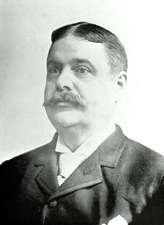Edward O. Wolcott
Edward Oliver Wolcott (March 26, 1848 – March 1, 1905) was an American politician during the 1890s, who served for 12 years as a Senator from the state of Colorado.
Edward Oliver Wolcott | |
|---|---|
 | |
| United States senator from Colorado | |
| In office March 4, 1889 – March 3, 1901 | |
| Preceded by | Thomas M. Bowen |
| Succeeded by | Thomas M. Patterson |
| Member of the Colorado Senate | |
| In office 1879–1882 | |
| Personal details | |
| Born | March 26, 1848 Longmeadow, Massachusetts |
| Died | March 1, 1905 (aged 56) Monte Carlo, Monaco |
| Resting place | Woodlawn Cemetery, The Bronx, New York |
| Political party | Republican |
| Alma mater | Yale University Harvard Law School |
Early life
Wolcott's parents were Samuel Wolcott, D.D. and Harriet Amanda (Pope) Wolcott. Wolcott was one of eleven children, including Anna Wolcott Vaile.[1][2] A native of Hampden County, Massachusetts, Wolcott moved to Ohio as a boy.[3]
Career
Military service
He served in the 150th Ohio Volunteer Infantry during the American Civil War.[3] He enlisted at age 16.[1]
Legal and political career
In 1875, he graduated from Harvard Law School and moved to Colorado where he set up a law practice. In the late 1890s and early 1900s, one of the partners in his practice was Charles W. Waterman, later a United States Senator.[3]
In 1879, Wolcott moved to Denver, where he began his political career as a Colorado state senator (1879–1882). In 1889, he was chosen to represent Colorado in the U.S. Senate, as a member of the Republican Party. He was reelected in 1895, and was an unsuccessful candidate for reelection in 1901, 1902 and 1903.
While in Washington, D.C., Wolcott was a leading advocate for the coinage of silver. In 1897, President McKinley named him chairman of the commission sent to Europe to report on international bimetallism. He was a popular host and guest in Washington society. He was chairman of the Committee on Civil Service (51st and 52nd Congresses), and Retrenchment Committee on Post Office and Post Roads (54th through 56th Congresses).
In 1900, Wolcott was denied renomination to the Senate, which ended his political career. He once again took up the practice of law in Colorado, and maintained that practice until his death.
Death
He died while he was on vacation in Monte Carlo. Wolcott's remains were cremated, and the ashes were interred at Woodlawn Cemetery in New York City. The town of Wolcott, Colorado is named after him.
References
- "The Wolcott Family". The National Magazine: (Cleveland) a Monthly Journal of American History. Magazine of Western History Publishing Company. 1889. p. 627–629.
- James Bretz (2010). Denver's Early Architecture. Arcadia Publishing. p. 114. ISBN 978-0-7385-8046-3.
- Sketches of Colorado. 1. Denver, CO: Western Press Bureau Company. 1911. p. 167.
Sources
- Nevins, Allan. Henry White : Thirty Years of American Diplomacy. New York : Harper & Brothers, 1930.
- United States Congress. "WOLCOTT, Edward Oliver (id: W000667)". Biographical Directory of the United States Congress.. Biographical Directory of the United States Congress.
| U.S. Senate | ||
|---|---|---|
| Preceded by Thomas M. Bowen |
U.S. senator (Class 2) from Colorado 1889–1901 Served alongside: Henry M. Teller |
Succeeded by Thomas M. Patterson |
